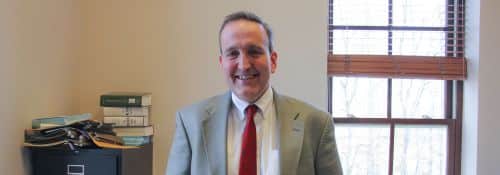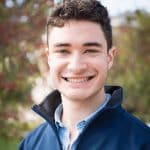
Constitutional History with Dr. Moreno
Written by Finn Cleary
Dr. Paul Moreno, dean of social sciences and a professor in Hillsdale’s history department, is back from a five-year hiatus in Washington, D.C., where he worked at the College’s Kirby Center and taught, among other classes, Constitutional history. He now teaches the class at the main campus, and though this course might appear similar to both Constitutional law and Politics 101, Dr. Moreno is quick to point out its distinction.
“I talk about political theory,” he says, “and economics, and try to meld the two to provide context for the course.”
Law becomes a more popular topic of conversation as the Supreme Court gains power, but Moreno’s main interest in Constitutional history is to provide thorough background for the cases and laws in American history.
“The law,” he says, “involves thinking about abstract principles in concrete terms. That’s why I talk about economic issues in class. It’s central to understanding the laws. It’s one thing to study the Clayton Antitrust Act, but it’s so much richer to dig into the details of labor strikes and disputes and how labor laws resolved or aggravated them.”
The course develops the story of the Constitution beyond the Civil War, as Dr. Moreno discusses in class the development of checks and balances in the federal government, the power of corporations and antitrust legislation, and ethnic tensions in the nation following Reconstruction.
Another significant direction he takes the course comes from what Dr. Moreno identifies as a crucial belief at Hillsdale: the conception of the law under the broader scope of Natural Law.
“I think it is really the thing that binds every department here at Hillsdale together,” he says.
Dr. Moreno’s work translating Natural Law into Constitutional Law began when he was a sophomore in college. The textbook for his class was written in part by Dr. Herman Belz, who later became a powerful influence on Moreno’s work as well as a personal friend. Dr. Moreno still uses The American Constitution: Its Origins and Developments (now in its seventh edition) in his course.
“The book,” he says, “is dense, which is why I think it is attractive to law students, but it is exceedingly fair to both the liberal position and Progressivism and a traditional Whig history of the growth of government and scrutiny.”
The course has evolved with time, and Dr. Moreno finds it more difficult every year to pack more information into a semester-long class. But it is rewarding work, and he enjoys bringing contemporary topics to task after months of preparation discussing the past.
“Law is where logic meets life,” he says, “and you can see in the regime that is not corrupt where the application of principles working is.”
Dr. Moreno’s class continues to offer real-life examples of these high principles in action and the debate over them.
 Finnegan Cleary, class of ’18, is a history major with plans to work in the public policy field. During his one year (and counting) with the blog, he has focused on stories about Western thought and the importance of community. When he isn’t writing or reading, he enjoys cooking and long-distance running. Finnegan is from Columbus, Ohio.
Finnegan Cleary, class of ’18, is a history major with plans to work in the public policy field. During his one year (and counting) with the blog, he has focused on stories about Western thought and the importance of community. When he isn’t writing or reading, he enjoys cooking and long-distance running. Finnegan is from Columbus, Ohio.